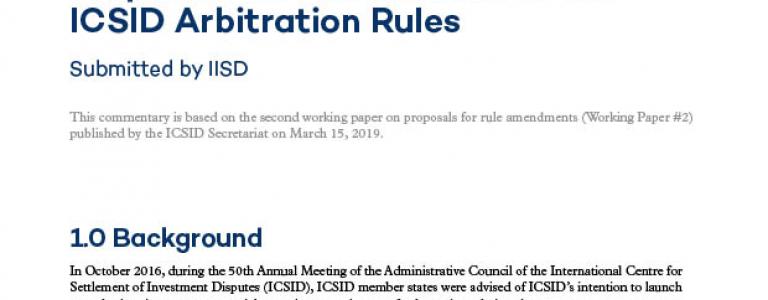Summary Comments to the Proposals for Amendment of the ICSID Arbitration Rules
This commentary focuses on select aspects of the ICSID Secretariat's March 15, 2019 draft proposals for amendment of the ICSID Arbitration Rules.
Key Messages
- This commentary focuses on select aspects of the proposed amendments to the Arbitration Rules of the International Centre for Settlement of Investment Disputes (ICSID) that merit further development, as well as on some key aspects not covered in the ICSID Secretariat's March 15, 2019 draft.
- The proposed amendments signal an effort to improve the procedural rules governing ICSID arbitration, but fail to appropriately address many concerns expressed by states and other stakeholders and fall short of promoting meaningful reform of investor–state dispute settlement (ISDS).
- In the ICSID Secretariat's analysis, many priority reforms identified by states may not be achieved through amendment of the ICSID Arbitration Rules. If this analysis is accurate, ICSID member states should also consider amending the Convention on the Settlement of Investment Disputes Between States and Nationals of Other States (the ICSID Convention).
On March 15, 2019, the Secretariat of the International Centre for Settlement of Investment Disputes (ICSID) issued a working paper (WP #2) in the context of a rule amendment process launched in October 2016.
The ICSID Secretariat expressed its hope to achieve broad consensus on the current draft so that a final proposal can be sent to members, allowing them to vote on the amendments in October 2019. The secretariat also welcomed comments on WP #2 by states and the public by June 10, 2019.
This document provides summary comments to WP #2, prepared by IISD. The commentary focuses exclusively on select aspects of the proposed amendments to the ICSID Arbitration Rules and to the Arbitrator Declaration that merit further development. It also addresses some key aspects not covered in the current draft.
The proposed amendments fail to appropriately address many concerns expressed by states and other stakeholders with respect to treaty-based investor–state arbitration. While signalling an effort to improve the procedural rules governing ICSID arbitration, they fall short of promoting meaningful reform of investor–state dispute settlement (ISDS).
Many priority reforms identified by states may not be achieved through amendment of the ICSID Arbitration Rules, according to the ICSID Secretariat. If the secretariat's analysis is considered accurate, ICSID member states should, in parallel to the rule amendment process, consider amending the Convention on the Settlement of Investment Disputes Between States and Nationals of Other States (the ICSID Convention).
Additional downloads
You might also be interested in
Stabilization Clauses: The hidden provisions that can hinder tax and investment policy reform
Stabilization clauses should no longer automatically be included in contracts between states and investors. If they are, they should, at a minimum, build on the latest international standards on stabilization to avoid being a barrier to sustainable development.
What Drives Investment Policy-makers in Developing Countries to Use Tax Incentives?
The article explores the reasons behind the use of tax incentives in developing countries to attract investment, examining the pressures, challenges, and alternative strategies that exist.
Brussels push to ban ECT disputes gains traction
Two arbitration victories for Spain under the Energy Charter Treaty (ECT) have sparked hopes that efforts to halt the intra-EU disputes that dominate claims under the controversial global pact are starting to bear fruit. Climate scholars, like IISD's Lukas Schaugg, believe the tribunal wins this month signal growing acceptance in international legal circles that EU investors cannot bring ECT claims against other member state governments.
Sustainability rules to impact global trade
Developed countries should consult developing countries in crafting global sustainability rules to prepare these markets for the impact of stringent regulations that may hamper global trade, a United Nations official said at IISD's recent Investment Policy Forum.
